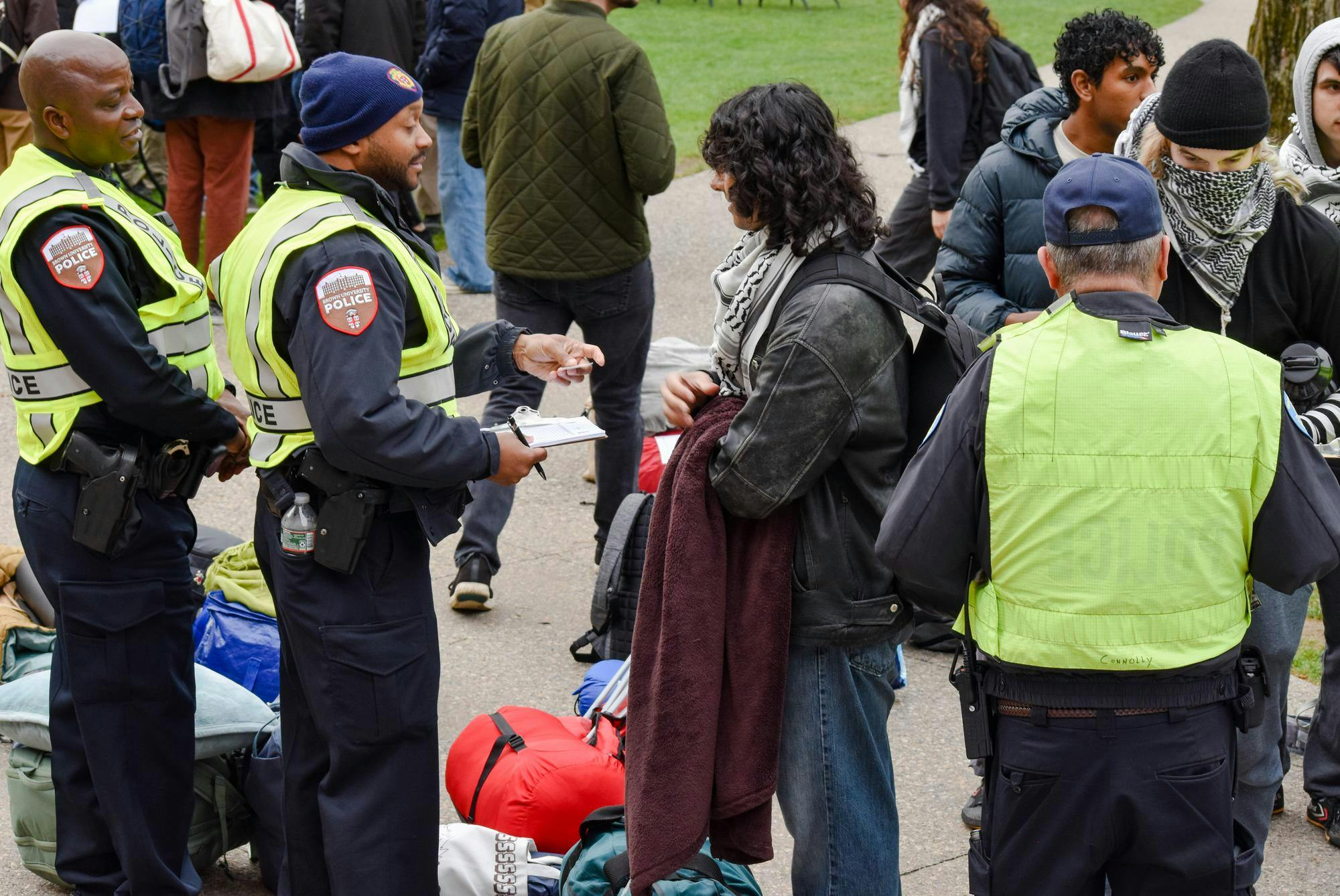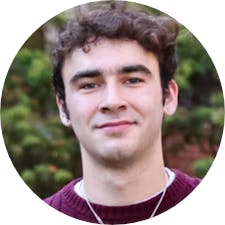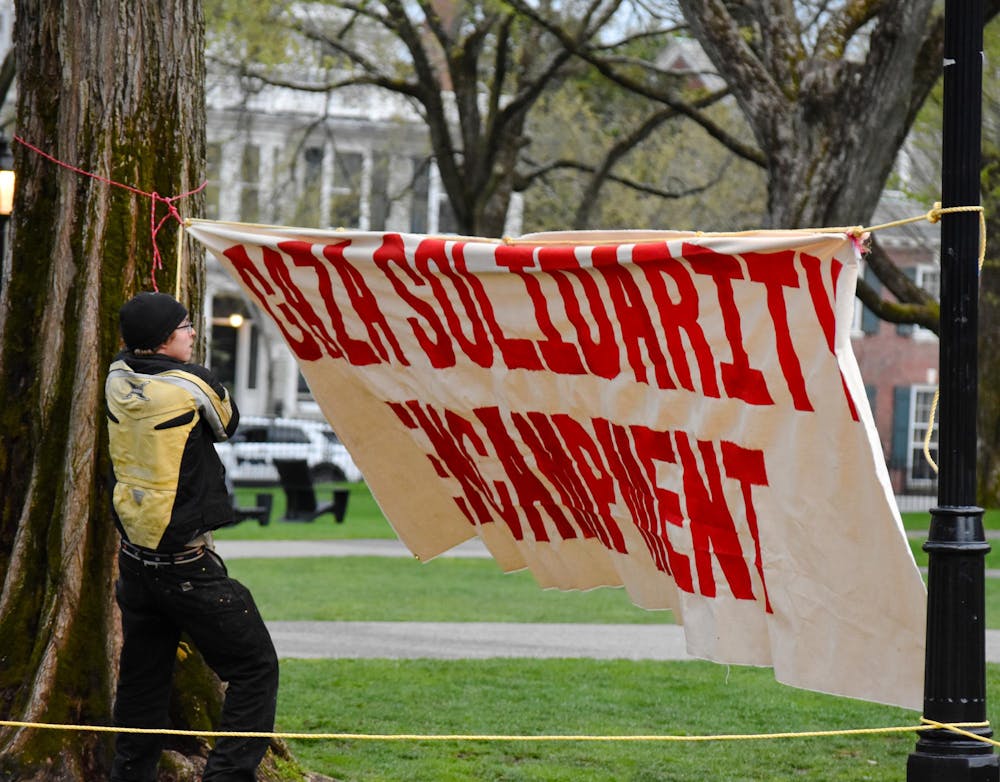Approximately 80 students began an indefinite encampment on the Main Green at around 6:20 a.m. Wednesday in a call for the University to divest from companies linked to the Israeli government. The encampment follows similar developments across the U.S. in the past week, most notably at Columbia, Yale and New York University.
In a press release obtained by The Herald, the protesters originally claimed that 80 students were participating. As of 8 a.m., 75 students were participating, according to encampment spokespeople.
The protesters demand that the University adhere to a 2020 report compiled by the Advisory Committee on Corporation Responsibility in Investment Practices that recommends “divestment from companies that facilitate the Israeli occupation of Palestinian territory.”
Activists are also calling on the University “to protect free speech on campus” and drop the charges of the 41 students arrested in a Dec. 11 University Hall sit-in, according to the press release.
“Protest is an acceptable means of expression at Brown, but it becomes unacceptable when it violates University policies that are intended to ensure the safety of members of the Brown community and that there is no interference in the rights of others to engage in the regular operations of the university,” University Spokesperson Brian Clark wrote in an email to The Herald. “We have been troubled by reports of violence, harassment and intimidation at some encampments on other campuses, but we have not seen that kind of behavior at Brown. Any such behavior would not be tolerated.”
This is the latest pro-Palestinian protest at Brown since the beginning of the war between Israel and Hamas, at all of which protesters have made similar demands.
On April 17, Columbia students established a “Gaza Solidarity Encampment” on the university’s South Lawn. The next day, police arrested 108 protesters at Columbia. The encampment is now on its eighth day.
After similar demonstrations broke out at Yale and at New York University, 47 protesters from Yale and 120 from NYU were arrested on April 22. Yale students who were arrested received Class A misdemeanors, the Yale Daily News reported.
President Christina Paxson P’19 P’MD’20 had previously refused to bring ACCRIP’s recommendation to the Corporation — the University’s highest governing body — who makes the final decision on any divestment proposals. Paxson wrote in a letter that “the recommendation did not adequately address the requirements for rigorous analysis and research as laid out in ACCRIP’s charge, nor was there the requisite level of specificity in regard to divestment.”
On Tuesday afternoon, Provost Francis Doyle sent an email to the Brown community stating that any encampments at Brown stand in violation of University policy and that any student participating could face disciplinary action from the University, “up to and including separation from the institution.”
An encampment itself is not an arrestable offense, he wrote, but “any encampments or offenses violating the law — including any point at which escalating circumstances dictate the need for encampment removal — may include law enforcement response and arrest.”
At approximately 6:50 a.m. members of the Department of Public Safety began asking for student protestors’ school IDs. Christian Manning, program director of military-affiliated students, reiterated the contents of Doyle’s email and said students “should expect to hear from the Office of Student Conduct and Community Standards via email.”
At around 12:35pm , Vice President for Campus Life Eric Estes and several DPS officers came to the main green, scanning the IDs of the students participating in the encampment. Officers went around to tents, asking demonstrators to identify themselves.
Estes declined to comment when asked by The Herald.
In his email yesterday, Doyle said that failure to present school IDs “is a violation of policy.”

Students participating in the encampment hand their Brown IDs to the Department of Public Safety.
Brown’s Green Space Policy, which the University issued in October 2011, prohibits “events involving encampments on Historical Greens or residential quadrangles.” Historical greens include Ruth Simmons, the Quiet Green and the Main Green. This portion of the policy was first established in October 2011, Clark wrote.
Encampments have posed safety concerns for community leaders and administrators at other universities. At Columbia, multiple Jewish students reported antisemitic incidents over the past week, the Columbia Daily Spectator reported. Those concerns prompted Columbia’s Rabbi Elie Buechler to recommend that Jewish students “return home as soon as possible and remain home until the reality in and around campus has dramatically improved,” Buechler wrote in a Sunday message to a group chat of more than 290 students.
On Monday, Columbia shifted all classes on its Morningside campus to a hybrid model until the semester ends. Politicians, including New York Governor Kathy Hochul and multiple members of the U.S. House, condemned the demonstrations and called on Columbia to improve campus safety.
In a recent Q&A published by the University, Vice President and Chief Investment Office Jane Dietze said that “given today’s realities, it’s not possible to divest the way Brown did in South Africa or Sudan.”
Dietze referred to increased reliance on external managers, which oversee 96% of Brown’s endowment, as barriers to divestment. Of the 4% of the endowment the University directly invests, none are affiliated for “any of the companies discussed in the current divestment debates,” she said.
Brown’s encampment marks a continued call for divestment from companies affiliated with Israel this academic year. On Nov. 8, police arrested 20 students affiliated with Brown Jews for Ceasefire Now following a University Hall sit-in; another 41 students with Brown Divest Coalition were arrested during a Dec. 11 sit-in and placed on University probation. The 41 students from the December sit-in continue to face criminal proceedings.
In February, a group of protesters partook in an eight-day hunger strike demanding that the Corporation “hears and considers a divestment resolution.” Paxson refused to meet their demands, instead encouraging them to submit a divestment proposal to the Advisory Committee on University Resource Management — ACCRIP’s successor.
In response, the strikers argued that the ACURM proposal consideration process would take too long, saying that it could “take months — an untenable timeline given the urgency of the crisis in Gaza.”
In an interview with The Herald, Paxson said that she would “ask ACURM to fast track” divestment consideration, should a proposal be submitted.
Throughout the day, organizers at the encampment held programming that included teach-ins, dancing and art-builds. Several faculty members stopped by the encampment to show their support.
At 8 p.m., Brown University Jews for Palestine hosted a “Liberation Seder” that encouraged anyone to join in “ritual and reflection.”
The encampment met minimal resistance by self-identified pro-Israeli counter-demonstrators.
At approximately the same time as the seder, a group, consisting of students from Johnson and Wales University and at least one employee of Brown, all said that they supported the students’ right to protest but disagreed with their position in interviews with The Herald. The students said that they were hoping for a peaceful, two-state solution to the ongoing war between Israel and Hamas.
Omeed, an employee of the University, said that the protesters should seek civil conversations with one another and disagreed with the encampment’s approach, saying that he was “very surprised at how willing people are to conform,” pointing to the protestors’ common labeling of the ongoing war between Israel and Hamas as a “genocide.” Omeed only disclosed his first name due to safety concerns.
“We continue to characterize Israel’s assault on Gaza as a genocide following rulings by prominent human rights organizations, the International Court of Justice, and leading scholars of genocide,” BDC wrote in a statement to The Herald. “We echo these groups in recognizing the ongoing mass slaughter of innocent civilians in Palestine — as of the latest counts, at least 34,262 Palestinians have been killed—as genocide.”
BDC also emphasized that this demonstration was a result of individual choice.
“Every single student in the encampment is facing great personal risk to remain there,” including disciplinary action, they wrote. “The choice of each student was a personal one driven by a commitment to pursuing justice and liberation for all. Each student has considered their presence in this movement with gravity and care.”
Correction: Due to a data-entry error on a University website, a previous version of this article misstated the date that Brown issued its Green Space Policy. The policy was issued in October 2011. The Herald regrets the error.

Owen Dahlkamp is the managing editor of newsroom on The Herald's 135th Editorial Board, overseeing the paper's news operations. Hailing from San Diego, CA, he is concentrating in Political Science and Cognitive Neuroscience with an interest in data analytics. In his free time, you can find him making spreadsheets at Coffee Exchange.

Ryan Doherty is the managing editor of digital content and vice president of The Herald's 135th editorial board. He is a junior from Carmel, NY who is concentrating in chemistry and economics. He previously served as a university news and science & research editor, covering faculty and higher education.





